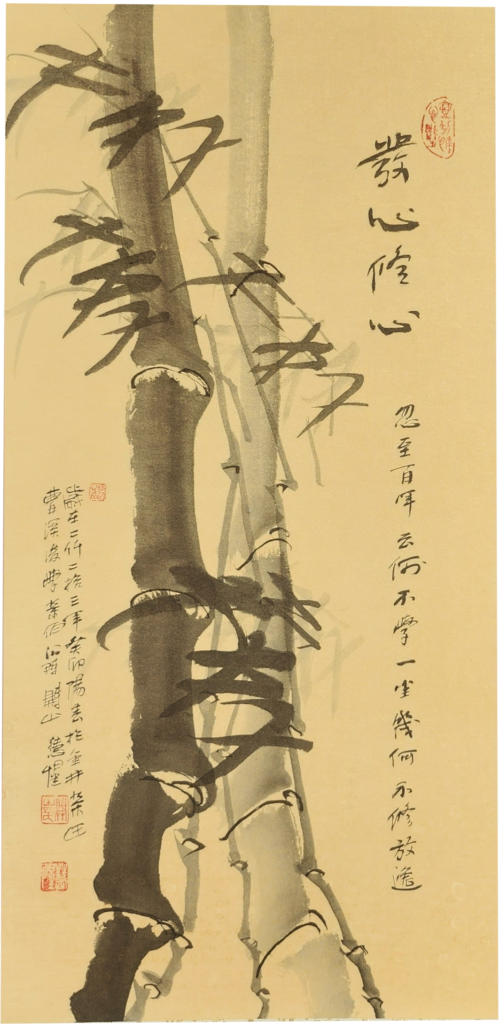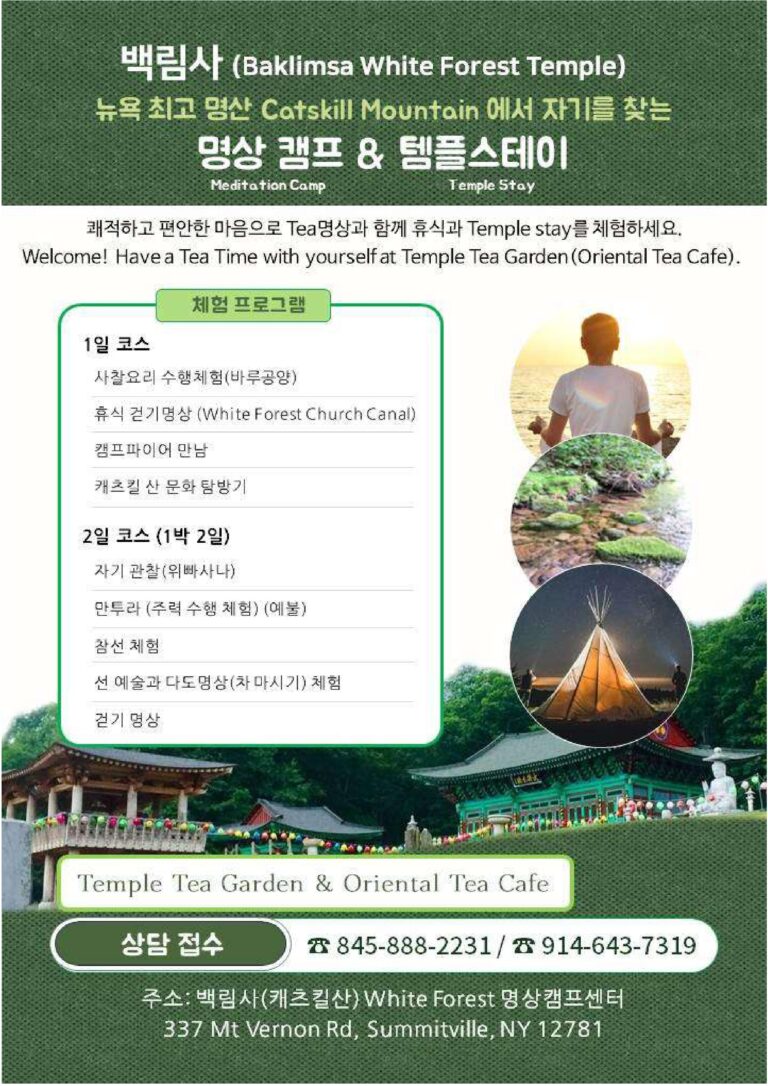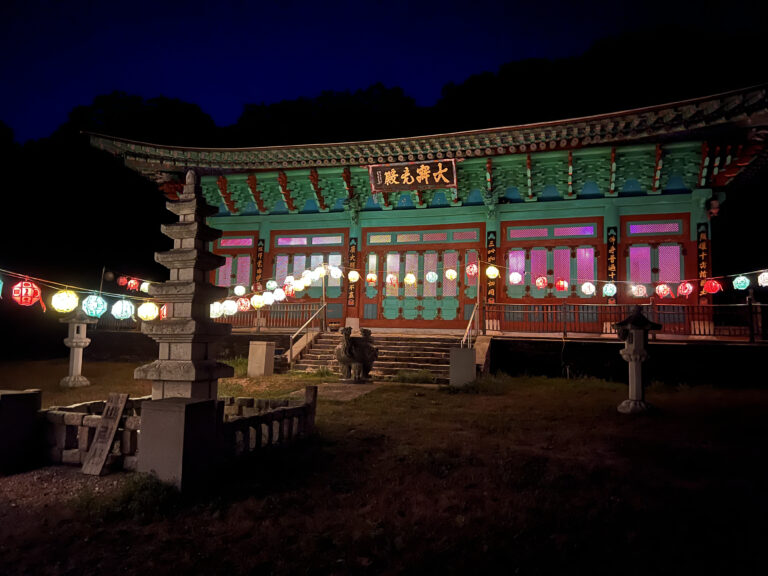Add Your Heading Text Here

발심수행장(發心修行章) – 원효(元曉, 617∼686) 스님
홀지백년(忽至百年) 운하불학(云何不學) 일생기하(一生幾何) 불수방일(不修放逸)
On Cultivation and Renunciation
With the swift passage of a hundred years in the blink of an eye, how can one not learn, and how negligent to not cultivate in such a brief life?
This is a well-known teaching of Venerable WonHyo Sunim (AD 617 – 686) in Korea. The Seon (Zen) Calligraphy was done by Hye-Seong Sunim of Baklimsa Temple. The full teaching is below.
On Cultivation and Renunciation: Teachings of Wonhyo, Full Context
All Buddhas solemnly attain the state of liberation, free from even a speck of delusion or confusion, through countless eons of relinquishing greed in ascetic practice.
Countless sentient beings cannot escape the three realms and continue to transmigrate because they have not let go of their greed throughout endless ages.
Few are born into the unobstructed paradise because sentient beings make their homes and wealth out of the three poisons of greed, hatred, and delusion.
Many are born into the undesirable paths where there are no temptations because they cherish their physical bodies and all desires as treasures.
Who would not wish to enter the mountains to cultivate the Way? Yet, many are unable to do so, entangled by their worldly desires.
However, even if one does not succeed in cultivating the mind in the mountains, one should not neglect to do good within their capacity.
If one can renounce worldly pleasures, they will be trusted and respected like a sage, and by practicing the difficult acts of the six paramitas, they will be revered like a Buddha.
Craving and greed for material wealth are the affiliates of demons, while compassion and generosity are the disciples of the Buddha.
High rocky mountains are dwellings for the wise; deep valleys with green pines are retreats for practitioners. When hungry, soothe your hunger with tree fruits; when thirsty, quench it with flowing water.
Even if nourished with delicious food and cared for tenderly, this body will eventually decay; even if clothed in soft and fine garments to protect it, this life will surely end.
Turn echoing rock caves into your chanting halls, and find joyful companionship in the mournful cries of geese.
Even if your knees freeze during meditation and prayers, do not crave warmth; even if your stomach feels as if it’s splitting from hunger, do not think of seeking food.
With the swift passage of a hundred years in the blink of an eye, how can one not learn, and how negligent to not cultivate in such a brief life?
Those in the middle way of attachment and clinging are called monks, and those who have shaken off worldly longings are said to have renounced.
If practitioners entangle themselves in the net of sensual desires and worldly affairs, it is like a dog wearing an elephant’s hide; if one cultivating the Way harbors worldly affections, it is as inappropriate as a hedgehog trying to enter a mouse hole (easy to enter, hard to exit).
Even if talented and wise, those living in the secular world are pitied by the Buddhas, while even those not cultivating the Way but living in monasteries bring joy to many saints.
Even if one has talent and learning, without moral conduct, they are like someone who, though led to a treasure trove, does not rise to follow.
Even if diligently cultivated but without wisdom, it is like trying to go east but heading west.
The cultivation of the wise is like steaming rice to make a meal; the cultivation of the foolish is like steaming sand hoping for rice.
Everyone knows how to eat to satisfy hunger, but not how to learn the Dharma to correct foolish minds.
Moral conduct and wisdom are like the two wheels of a cart, and the practice of selflessness is like a bird flying with both wings.
Even if you receive donations and give blessings, if you do not understand the fundamental Dharma, how can you not be ashamed?
Accepting offerings and chanting prayers without adhering to the fundamental principles is as culpable and shameful before the saints.
Just as people despise maggots for not distinguishing between clean and dirty, the saints despise monks who cannot discern purity from worldliness.
Renouncing the tumult of the world and ascending to the realm of truth, keeping precepts serves as a good ladder,
Therefore, breaking precepts and becoming an object of reliance (someone to take refuge in) is like a bird with broken wings trying to fly by carrying a turtle on its back.
If you cannot dissolve your own karma, how can you dissolve others’? Without moral conduct, how can you accept others’ offerings?
Cultivating a vain body without practice is futile, and cherishing a life as transient as grass cannot preserve it,
If you wish to become a wise sage fully aware of the Dharma, endure the pains of practice well, and if you promise a place in the Buddha’s Nirvana, forever turn away from desires.
If the mind of a practitioner is pure, all heavenly beings will praise them; if one cultivating the Way inclines their heart to the phenomenal and secular worlds, various gods will abandon and leave them.
The four great elements disperse swiftly, preserving nothing for long; suddenly, this life reaches its twilight, inevitably facing the dawn of the next.
With later pains following the pleasures of the secular, why cling to them? By enduring desires once, long-lasting joy ensues, so why not cultivate?
The greed of those cultivating the Way is a great shame for practitioners, and the wealth of renunciates is a laughing matter among secular gentlemen.
Excuses are endless for not stopping greed and attachment (finding various pretexts), and though delaying (practice) endlessly with ‘next time, next time,’ they never cut off attachment.
Such endless matters keep one from renouncing worldly affairs, with no end to hesitations about breaking away.
Today alone, today alone, but today never ends, so days of creating bad karma are many; tomorrow, tomorrow, but tomorrow never concludes, so days of creating good karma are few.
Even if one says ‘just this year,’ this year never ends, so delusions are endless; and saying ‘from next year,’ but next year is always just next year, thus never advancing on the path to enlightenment.
Time flows swiftly, days and nights pass quickly, each day rushes by, and suddenly a month changes, swiftly a year passes and reaches the next, and living one year after another, one soon arrives at death’s threshold.
Then, like a broken cart that cannot go further, one cannot cultivate in old age, only wishing to lie down and be lazy, just sitting down but distracted by delusions and confusions.
Having not cultivated for several lives, spending days and nights in vain, how can this empty body, like the void, not cultivate this one life?
The body will surely die and end its days; what will you do in the next life? How can one not be busy and urgent, not urgent and busy?



